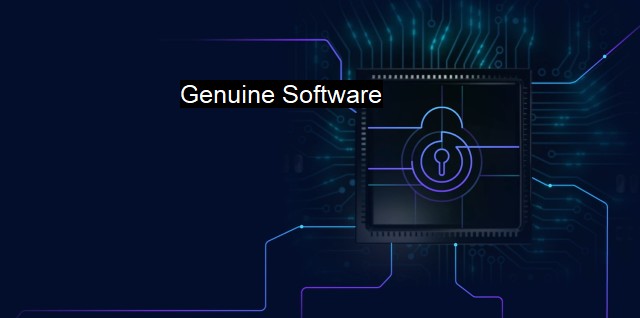What is Genuine Software?
The Rising Importance of Genuine Software in Today's Cybersecurity Landscape
Genuine software refers to a legitimate and legal copy of software that is licensed and sanctioned by the proper copyright holders. Conceived and developed by an authorized entity, it includes a license for end-user use, and typically comes along with a product key to verify its authenticity. This software is developed following quality standards, containing all coding, operational features, and functionalities that promote smooth and error-free software use.The relevance of genuine software runs deeper than just being a proof of legality and authenticity. Use of genuine software is an integral aspect to maintain the strength and reliability of a cybersecurity ecosystem, which has been defined by the advent of antivirus software.
Compared to counterfeit or pirated versions, genuine software often contains less security risks. What is often ignored is that counterfeit software does not merely constitute a breach of a licensee agreement, but it also poses grave security threats that can put personal and critical information at risk. Pirated software is frequently associated with malware, viruses, and other dangerous components prone to hacking or spyware.
Genuine software, specifically including cybersecurity and antivirus software, is constantly updated by the developer to patch security vulnerabilities and to reinforce its provisions against cyber threats. Developers work continuously to identify vulnerabilities, develop fixes, and roll out updates. This dynamic is absent in counterfeit software; hence, it exposes its users’ systems to cyber attacks and data theft, making genuine software an indispensable tool in the interconnected world of today.
Implementing genuine software in a business environment is crucial to protect one's digital assets, maintain the integrity of network infrastructure, and to engage in ethical business practices. Genuine antivirus software protects networks from frequent hacking attempts, harmful viruses, malware, and other potentially catastrophic cyber breaches. It promotes a reliable and secure working condition that allows productivity while ensuring the security of systems and data involved.
Using non-genuine or pirated software carries legal consequences. Authorities, such as the Software & Information Industry Association (SIIA), Business Software Alliance (BSA), and even governments around the globe, have continually been cracking down and penalizing illegal software distribution and use not to undermine the software industry but to potentially curb security risks. Fines, reparations, and other legal actions are exacted upon individuals and entities found using or distributing non-genuine software. The risk of legal complications is an additional incentive to opt for genuine software.
Genuine software also ensures an optimal user experience by providing the full functionality the software intends to offer. An aspect of using counterfeit software is the tendency of some features not working correctly. Discrepancies and errors, which might lead to potential system crashes or data losses, are more likely experienced when using non-genuine software. On the other hand, opting for genuine software offers more reliability and overall security.
In this era of instant communication where digital assets, operations, and strategies encompass the forefront of organizational success factors, perpetuating vigilance in terms of digital security is vital. Promoting the use of genuine software is not simply a matter of legality but it is a fundamental theme of maintaining a robust and secure cyber infrastructure.
Genuine software is more than a sticker or a product key. It’s about software built with precision to secure customers' assets – working tirelessly behind the scenes to protect valuable data, safeguards operations, and providing their own worth by defending against the constant barrage of cyber threats. An acquired genuine software is a step towards a more secure digital environment. It possesses countless merits and values that exceed the risk and cost of opting for their illicit counterpart – a unanimous proof of the technological world that software isn’t just a tool, it is an investment.

Genuine Software FAQs
What is genuine software?
Genuine software refers to software that has been legally obtained and has not been tampered with or modified in any way. It is software that is licensed and authorized by the software developer.Why is it important to use genuine software for cybersecurity?
Using genuine software ensures that the software is up-to-date with the latest security patches and updates, reducing the risk of cyber attacks. It also means that the software is free of malware that could be introduced through pirated or counterfeit software.What are the consequences of using pirated or counterfeit software?
Using pirated or counterfeit software can result in legal consequences, as it is illegal to use software without proper licensing. Additionally, it can lead to cybersecurity risks, as the software may contain malware or vulnerabilities that could be exploited by cyber criminals.How can I ensure that the software I am using is genuine?
To ensure that the software you are using is genuine, you should purchase it from a reputable source, such as the official website of the software developer. You should also verify the license and authenticity of the software with the software developer.| | A | | | B | | | C | | | D | | | E | | | F | | | G | | | H | | | I | | | J | | | K | | | L | | | M | |
| | N | | | O | | | P | | | Q | | | R | | | S | | | T | | | U | | | V | | | W | | | X | | | Y | | | Z | |
| | 1 | | | 2 | | | 3 | | | 4 | | | 7 | | | 8 | | |||||||